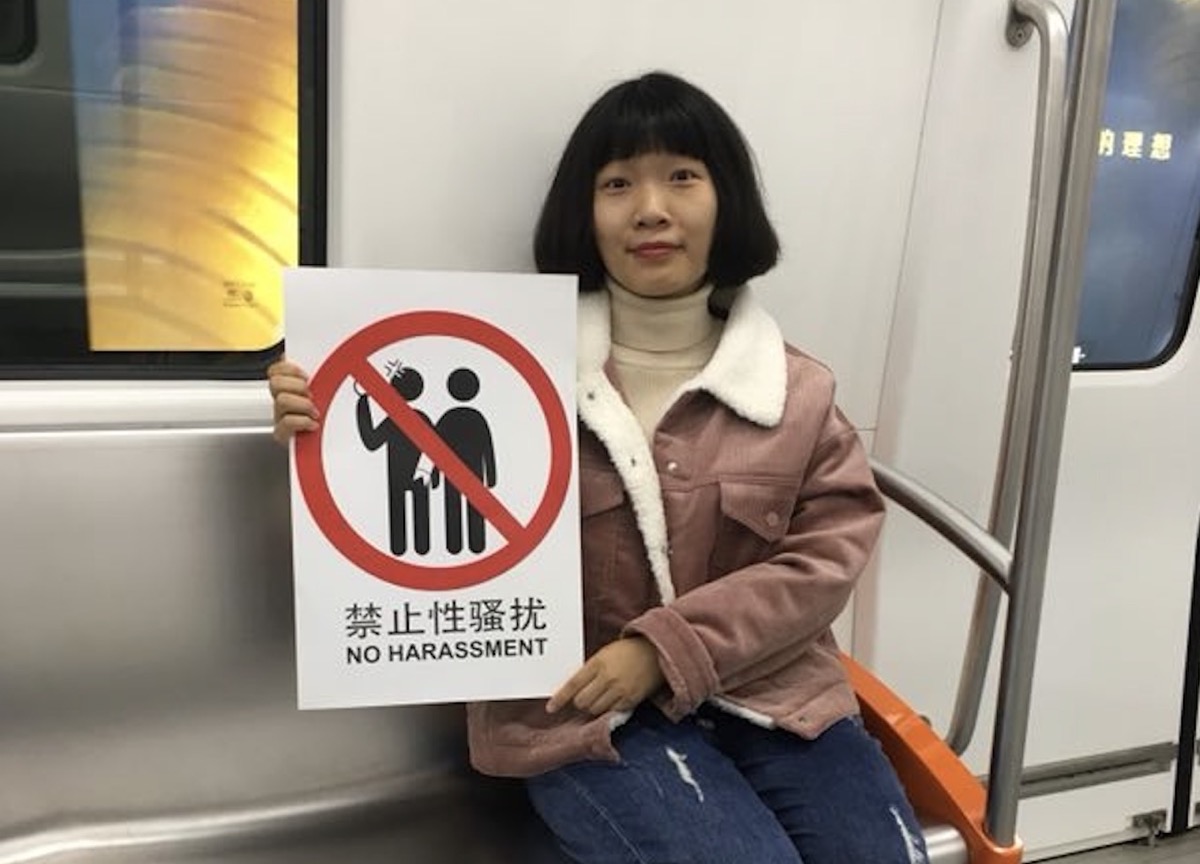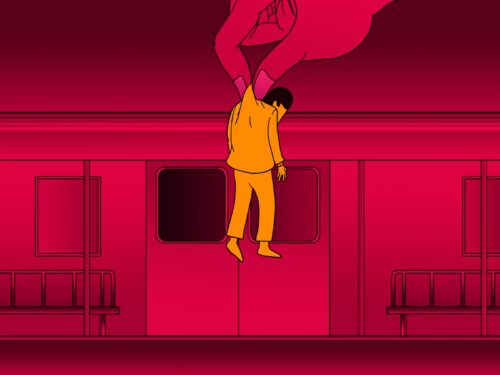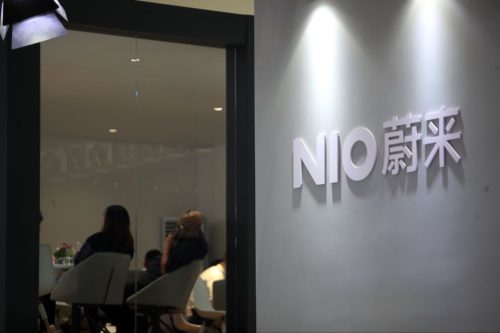China’s sexual harassment problem

Zheng Xi 郑熹
As the messages pinged in a group chat on her phone, Sofia Huang Xueqin 黄雪琴 grew more and more angry. How come she didn’t protect herself? asked some. She must have behaved a little too frivolously, implied another. It was June 2016, and news had just broken that a 21-year-old female intern at Guangdong’s Nanfang Daily reported being raped by a 29-year-old male journalist at the same paper. As the questions and comments piled up in her WeChat account, Huang couldn’t take it anymore.
The next day, she typed up a story she had kept mostly private for five years — her own experience of being sexually harassed by a senior journalist when she, too, was a young, ambitious reporter in Guangzhou. For Huang, who parried unwanted physical advances by the colleague whom she had respected and felt had valued her as a professional, the experience was life altering. Uncomfortable seeing him in staff meetings, Huang, then 24, left her job a month later.
“I didn’t say anything when I resigned, and the girls who came after me, they suffered, too,” said Huang, now 29, who has chosen not to name her former publication or the senior journalist. When she shared her story on her private WeChat account last year, it was to confront the misconception that she had as a young woman, which she saw again manifesting itself in the group chat: “It is very common logic to blame the victim,” she stated. “But why should I have some strong sense of humiliation? Why should I be ashamed of myself?”
This question is at the heart of every discussion of sexual harassment that’s playing out around the world. In America, a cathartic and long-overdue conversation about sexual harassment has reverberated across all industries, from comedy to politics, sparked by allegations of sexual misbehavior against Hollywood mogul Harvey Weinstein and fueled by an outpouring of personal stories via the social media hashtag #MeToo. In China, attempts to discuss sexual harassment happens at the crossroads of rapid modernization and traditional values, across lively channels of social media but within a framework checked by state censorship. But the global #MeToo movement and the Weinstein effect have barely permeated the closed circuit of China’s state and social media.
“Sexual violence in China is such a serious, deep-rooted problem. It is literally everywhere, it permeates society,” said feminist and author Leta Hong Fincher on a recent Sinica podcast. “If there were a news organization that wanted to try to do some kind of investigation, kind of like the New York Times’ investigation of Harvey Weinstein and Hollywood, it would be shut down.”
“It is very uncommon that women come forward because they think it is a scandal, and they are embarrassed with this kind of situation…it takes time to develop the conditions conducive for women to come forward.” —Lu Xiaoquan, lawyer
Sexual harassment appears to have touched the majority of China’s women, very much to the contrary of a now-deleted state media op-ed’s claim that harassment is virtually nonexistent in this country. One study conducted by two City University of Hong Kong professors revealed that 80 percent of working women have encountered sexual harassment at least once; a survey by Peking University’s School of Public Health found that 35 percent of college students had experienced gender-based discrimination or sexual violence. The public is not ignoring the problem: Anti-sexual-harassment activism, like the subway protest launched by the “Feminist Five” in 2015, has garnered mainstream attention, and social media has become a forum where a limited, but growing, number of women have spoken out about personal experiences. So far, however, the highest-profile revelation has not been from the mainland, but Hong Kong, when star athlete Vera Lui Lai-yiu last week recalled being sexually assaulted by her coach 10 years ago.
“There is more and more openness on the topic than there used to be, more news than before, and more and more people are daring to tell their experiences on the internet,” said Manman Lu 陆蔓蔓, editor of Feminist Voices 女权之声, a Beijing-based online magazine that focuses on women’s issues and monitors gender and the media. But when it comes to public opinion, there is still “stigma on the victims of harassment. I think deep down, most people still think it is shameful for the victims.”
This is one reason why, while every casual conversation about workplace harassment seems to elicit anecdotes about “something that happened to a friend,” a #MeToo-type movement still feels far away for China. For example, last week, a Shanghai woman received nasty online comments after publicizing a post about a serial molester in her neighborhood, and her WeChat post was censored.
In addition to the cultural stigmas associated with coming forward, China still largely lacks repercussions for sleazy bosses and workplace assaulters. A report compiled by the public interest Beijing Qianqian Law Firm 北京千千律师事务所 found that more than 31 percent of women chose to stay silent about sexual harassment in the workplace because they felt that speaking up would not get anything resolved. The same report indicates that the same percentage of employees accused of harassment received no consequences whatsoever.
Individuals or groups who try to bring public awareness to sexual harassment or to instill change often encounter pushback from authorities. Feminists staging protests are arrested or harassed to the point that they must leave their homes. A tightening of civil society in recent years has squeezed resources dedicated to women’s rights. For example, the public interest law firm mentioned above, Beijng Qianqian, was founded by the Beijing Zhongze Women’s Legal Counseling and Service Center, a leading, globally recognized non-governmental organization advocating for women’s legal rights; Zhongze was shuttered early last year after 20 years of operation, reportedly under government pressure.

Huang, the journalist who publicly shared her story last year, is in the midst of fighting the silence that shrouds sexual harassment on a personal and public level. Inspired by #MeToo, she is creating an anti-sexual-harassment platform for victims to share their stories and find resources, and last month, she launched a survey of sexual harassment in the media industry. More than 200 women replied in the first week, with 60 sharing personal stories — but 59 of those women wished to remain anonymous. Huang said that her attempts to get her own story published in the media have also been rejected. “In China, a lot of people would say, ‘Why would you want to show your scar to the public?’” she explained. “It’s really not easy.”
Yet she understands: Huang still hides her experience from her own parents, choosing to block them on social media. “They love me and they’d know that it’s not my fault,” she said. “But they’d have to explain to their relatives and their friends, and they’ll think, Oh, she spoke too much, or She wore too little, and I know these opinions will bother my parents.”
In some situations, if cases involve high-profile companies or people, they may be covered by state media. Such was the case last year when a manager at China Minsheng Banking Corp. was fired after an employee posted screenshots of his advances, widely circulated on Weibo, including his threats to fire her if she didn’t meet him in his hotel room. The employee, however, reportedly received no additional benefits, and had already quit her job. Trial-by-viral-reaction has its limitations. “In the end, we don’t know what really happened. If they come to a lawsuit, we don’t really know,” explained Lu, the Feminist Voices editor. “The news will enter into public discourse, but when it passes, nobody remembers the case.”
Many cases do not enter the court system, according to Lu Xiaoquan 吕孝权, a lawyer at the public interest Beijing Qianqian Law Firm. “It is very uncommon that women come forward because they think it is a scandal, and they are embarrassed by this kind of situation,” said Lu. “This relates to China’s current circumstances and cultural environment — it takes time to develop the conditions conducive for women to come forward.”
Although sexual harassment was expressly forbidden in a 2005 amendment to the Law on Women’s Rights Protection (an amendment that one state press release called “a special gift to the 10th anniversary of the United Nations Fourth World Conference on Women”…not to actual Chinese women), the law lacks a definition of sexual harassment or guidelines for its prosecution, making it difficult to prosecute. Under the current system, victims who file a suit in civil court will not typically file against a specific person for sexual harassment, explained Lu. Instead, they sue their company for workplace mistreatment or termination of contract, for example. Compensation for winning such cases is small, typically one month’s salary for employees who have worked at the company for more than a year. Based on the average Beijing salary, that would mean a victim would receive around 9,900 yuan ($1,500) of total compensation.
“Sexual violence in China is such a serious, deep-rooted problem. It is literally everywhere, it permeates society.” —Leta Hong Fincher, author
There is a parallel lack of clear-cut procedures for reporting and addressing sexual harassment at the company level. “Organizations should have corporate codes of ethics or sexual harassment policies to prevent or handle sexual harassment,” said Professor Michael Kwan (Kwan Ho Kwong), head of the department of organizational management at Tongji University’s School of Economics and Management. He listed some essential elements absent from many large Chinese companies, including training workshops on what constitutes sexual harassment and an ethics department to deal with complaints.
These shortcomings are part of workplace culture that is already unequal. “Cultural norms that dictate how men and women should be treated differently in the workplace are pervasive,” said Mandy Liu 刘志敏, a career counselor and blogger who focuses on advising young women entering the workforce. These prejudices are not always negative, she said. For example, male bosses may think of women as instilling “positive energy” into a work environment. But this can mean that they’re also expected to attend client dinners — quintessentially boozy, after-hours affairs — even when it may not pertain to their role at a company. And despite China’s status as the home of more female billionaires than any other nation, women on average make 35 percent less than their male counterparts for similar work
While Liu said she has not counseled women who have faced serious physical harassment, she is commonly asked by young women about how to deal with coworkers’ repeated sexual jokes, which they feel is “not really worth bringing up with the boss,” and is often widely tolerated in the workplace.
Liu recommends addressing these issues head on: “Say, ‘I don’t feel comfortable with your joking, you need to stop it,’” she said. Other suggestions are more creative. For Mickey Su 苏淑清, who has worked in sales in Shanghai for 15 years, when it comes to dealing with sexual harassment, women have to protect themselves however they can, whether that means “eating stinky tofu” before going somewhere alone with a boss, or recording inappropriate conversations as leverage or evidence. But, in her personal observations, making an official report comes with the risk of losing a job or being passed over for a promotion, while flirting or having sex with the boss can be a way to climb the corporate ladder. This kind of arrangement, as well as explicit sexual advances, are widespread, she said.
Real institutional change requires revising the way society views the issue, said Zheng Xi 郑熹, a Ph.D. candidate with a focus on gender studies at Zhejiang University in Hangzhou. Zheng has launched a campaign asking city governments around China to display anti-sexual-harassment logos, complete with a groper’s “salty-pig hand” visual (etymological context here), alongside other commonly displayed public safety logos on places like subway trains and buses.
“Changing people’s way of thinking is a long and difficult process,” said Zheng, who also goes by the name Zhu Xi Xi 猪西西 in her feminist work. She is starting with municipal policy because she recognizes the government power to change people’s minds and also to shut down movements. But she believes that the voices of those who stand up matter, and she hopes that these voices will continue to grow. “Whether [the government decides to change policy] or not is not because it is right or wrong — it depends on how many people try to push it to do so, it depends on what we do,” she said. “I cannot guess what the government will think, but I can be sure that if more people notice this, then the government will have to notice, too.”





